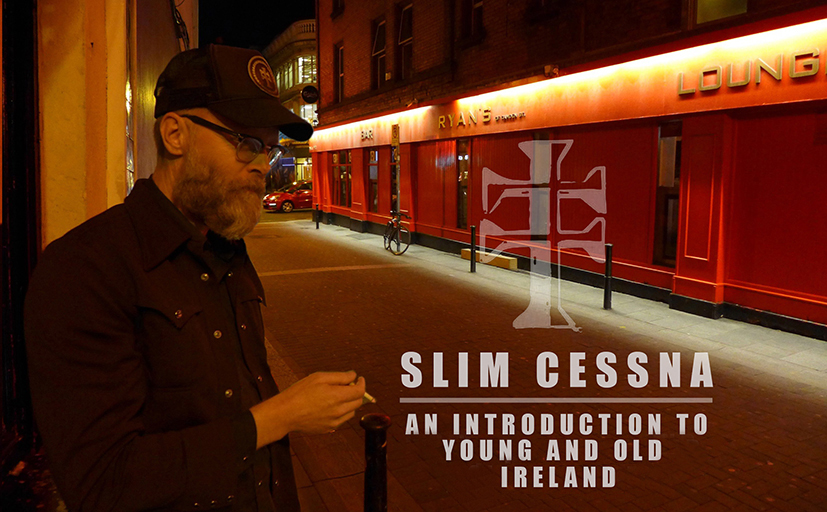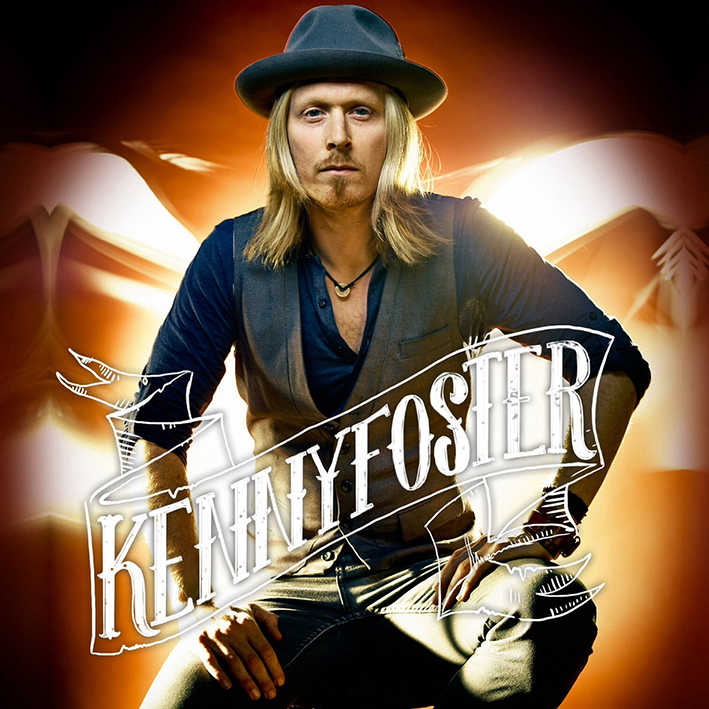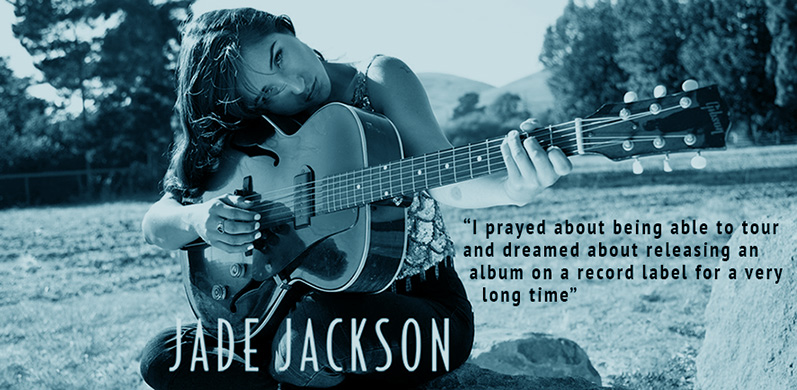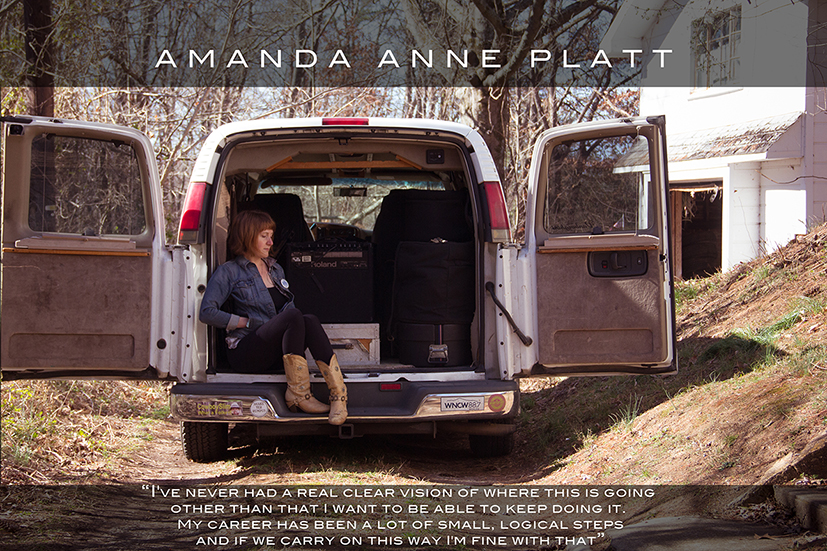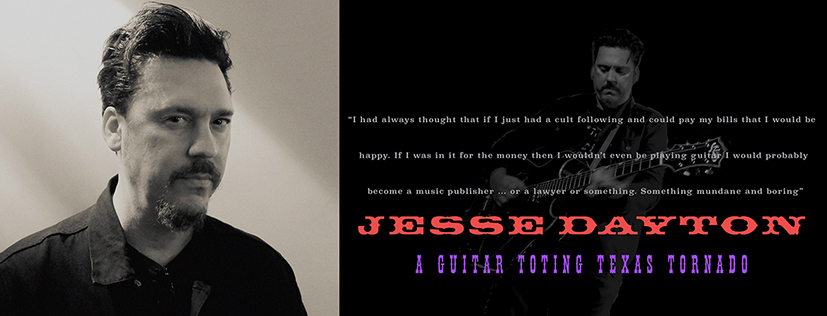
Jesse Dayton is a Texas born guitarist, singer and songwriter who has had an ancillary career in acting, directing, screenplay writing and composing soundtracks. He grew up on a diet of traditional country artist such as Hank Williams, Lefty Frizzell, George Jones, Waylon Jennings and Johnny Cash alongside the music coming from New Orleans and across the border with Mexico. To date he has released 9 studio albums under his own name, one of which was a duets album with Brennen Leigh. The first (Raisin’ Cain) came out in 1995 the most recent The Revealer was released in 2016. Prior to that Dayton had been a member of a rockabilly band The Road Kings who released one self-titled album. He is currently working on his next album and also has a screenplay in the works as well as an acting role on the cards too. A busy man and a very talented one whose guitar playing and production skills are much sort after.
What were the influences of a boy growing up in Beaumont, Texas?
A lot of Gulf Coast regional influences as it was the Texas/Louisiana border. I could very easily have gone to New Orleans as easy as I could have gone to Austin. Beaumont is pretty much in the middle. I took my parents out to dinner after my graduation, because I was making $500 a week playing in an all-black zydeco band, and I said I have good news and bad news. The good news is I got my own place I don’t need any money and I’m buying the dinner tonight. The bad news is I’m not going to go to the University of Texas.
I grew up playing honky tonk music, rockabilly, rhythm ’n’ blues and all that stuff. But in 1982 a friend of mine said “hey you want to go see The Clash?” So we drove to the Egyptian Theatre in San Antonio. We saw The Clash and Charlie Sexton and Joe Ely opened up the show. So I said “okay, that’s what I want to do.” The whole thing was something bigger than the playing.
Do you think there is a direct correlation to some honky-tonk and punk?
I would totally agree with that. So that meant that some people in Texas never understood me because they didn’t have that same experience. I was born in ’66, so I heard White Riot for the first time when I was 13 or 14 which must have been around ’78/’79 - something like that. Maybe in 1980, but close to it. So I wanted to bring that energy to roots music. My parents had played classic country music and that’s what separates me from the rest of those suburban kids in America because I could sit down and play Harlan Howard songs, or an obscure Willie Nelson song that was never on the radio. These other kids were into some other things, which I was in to too, like hard rock - Thin Lizzy or punk rock. But I knew things like Jolie Blonde and some Zydeco.
How did the wave of what was termed Cowpunk bands effect you?
I loved all those bands, but at that point once I had a guitar in my hands and when I was 15 I started putting my blinders on. I was in such a weird little town and none of that stuff hit there. If you look back a lot of those guys were also from small towns. They were often the ones that ended up with a discernible and unique sound. They were kind of in a little bubble. They end up doing what they think it’s supposed to sound like.
Did you think that when you released Raisin’ Cain (on Justice Records) that you were on your way to the big time?
No. I didn’t. Because before that I had already been asked to go to Nashville and talk to executives there at some major labels and I just thought that they were so square. I’d been driving to Houston to see Townes van Zandt and Guy Clark. So I had these different components compartmentalised in my head - ok, these are the singer/songwriter guys that I got to listen to. I had to put in my 10,000 hours on that and these are the guitar players that I think are really great. My brother was hanging out with Clifford Antone in Austin so I was also getting all this great blues stuff - seeing all these great blues guitar players. So when I got to Justice they said “make whatever kind go record you want.”
I had always thought that if I just had a cult following and could pay my bills that I would be happy. If I was in it for the money then I wouldn’t even be playing guitar I would probably become a music publisher … or a lawyer or something. Something mundane and boring.
When you started out did you see yourself primarily as a guitar player or a songwriter, Had you made any sort of choice?
I had always wanted to do them together. I had been around great players but they wouldn’t have any songs and I be around great songwriters but they might have a bunch of crappy players. You could tell and you just can’t bluff your way through that. People can hear that.
My parents were the first ones to make it out of the oil fields and to kinda become academics. So I was reading a lot, a lot of books. I was reading college stuff in Junior High. My parents had me reading The Dubliners alongside an autobiography of Malcolm X when I was in 8th Grade. That was really informing my lyrics. I was trying to put that together and as Springsteen had said I learned more from a 3 minute record than I ever did in school. Learning how to condense it into a song. It’s the way Townes explained those characters and that imagery, listening to a Townes songs is similar to reading a Cormac McCarthy book. It’s landscapes and big stuff.
That was opening you up to different ideas?
Yeah, but I didn’t realise it at the time as I was just doing it. I was little redneck kid in a small town so I didn’t know how to do it. I was in a bubble.
Another aspect of your career has been working in film as an actor, screenwriter and soundtrack maker. Has that also expanded your horizons?
Well I tell everyone that all my favourite country stars were in movies or on TV. All of ‘em! Jerry Reed, Willie, Cash - they were all on television shows and in movies. Then I got that call to do that soundtrack (The Devil’s Rejects) in ’07. The thing went big and Rob Zombie had given me 75% of the publishing. The people at the studio hadn’t realised that a rock star had directed the movie - which had really never happened until then - so they didn’t care about the soundtrack (released as Banjo & Sullivan - The Ultimate Collection 1972-1978). He just said to get on with it, that they’re not paying attention. So that became a thing in itself and the next one was put out on Rob’s label rather than with a major. I was in the movie (Halloween 11, he appeared as singer of the fictitious band Captain Clegg & The Night Creatures). He taught me how to make music videos. It was my one on one film school crash course. We then did an animated film and following on from that he said “why don’t you come on tour with me as the band from the movie, everybody will know you as they’ve seen the film.” He said that I’d have to be in character and not do any of my solo stuff. So I just said “How Much?” (Laughs) I’ve been trying to sell out for years as I hear the money’s awesome! So we went on out and it was a 40 date arena tour of North America. Huge places, like Ozzie-type shit.
I’m playing this weird hybrid of ‘60s surf rock and honky-tonk - it’s all over the place but it’s guitar music and it’s aggressive and kids are seeing me. So while I was on that tour I wrote two pages everyday and when I got home I had an 80 page script. I got it to Malcolm McDowell, who I had been in the movie with, and he said that he’s do it. As soon as I got him to sign on literally overnight I got all the money to make the movie (Zombex). I talked them into letting me direct it which was a kind of catastrophe (laughs) - but it worked. It was not fun. Being the director was the opposite of being a singer in a band. Total and utter sleep deprivation. I had it all in my head but not on paper. Luckily I had a really talented crew, a bunch of Robert Rodriguez’s people and some great actors. I got John Doe to be in it and I’d asked Mike Ness (Social Distortion) but he said “I can’t really act.” He said to get John Doe, that he was a real actor. Doe said that he would be in it if his friend could be in it too and get killed. So I said “well okay.”
However I felt I was little out of my depth so I ran screaming back into the arms of the music business. I did act in a couple of movies after that though and I’m doing a movie in Canada next year. I’m also licensing a motorbike gang script based on a Kurosawa movie. I like to work a lot.
When I was working with John Doe he asked me if I wanted to do the Letterman show with him. He’d said that he heard that I was a guitar player, he didn’t know too much about me. So I said “yeah man.” He called me after that to tell me that Billy (Zoom) was sick and that they had a big American tour to do and would I learn 30 songs and meet them (X) in New York in a week! It was nerve wracking as Billy Zoom is no slouch. That got me back out there touring again.
You played with The Supersuckers too.
Yeah, I played on Must Have Been High they’re biggest record. I have a demo of me and Eddie (Spaghetti) doing every song on that record on acoustic guitars weeks before we went in to record. They always say that I turned them on to country music. I opened up for them in Dallas and they were like “Man, we really don’t like country music.” I told them that they were really missing out. We supported them on the whole tour when they were playing those songs and Eddie would say that I was the guy who turned them on to country music and I said “Don’t tell them that!”
With all of what you have done and achieved do you want to do something different next or carry on doing what you have been?
Well a lot of my success has been in that I married a really hot, smart Jewish girl from Los Angeles. I’ve been with her almost 21 years and she put a gun to my head several times and said “look dummy, you’re going to take the money from this TV show and we’re going to buy a house in Austin. Which was at a time when you could buy at a reasonable price. Now our house is worth crazy money. Her family is like a publishing dynasty - her grandfather, Lester Sill, worked with Phil Spector and was the publisher for Elvis and Motown. Her father became even bigger than that. So she decided that we didn’t need other people who were essentially bad bank loans. So we would get enough money to make a record and hire a publicist as well as a radio guy. We stared to actually make money off our records. Her name is Emily Kaye, so she’s a big part of how I learned how to monetise this rather than be saying “Oh well, they’re dropping me because I didn’t sell over a 100,000 units.” I’ve never played that game. The end result was always about did we get more people. That’s all that matters. She took some of the money we made and invested it in other things. In real estate and stuff like that. So that’s the reason I can come and play a small gig like in Whelans and not freak about the money.
You played in Ireland once before I think?
Yeah I played a festival here a long time ago back in the ‘90s.We had to leave the same day which was bit of a bummer. But we want to come back over here and to Europe again as I’m shocked as to how great these shows have been. We haven’t been here for ever. It’s all been word of mouth and the record (The Revealer) has been out for a while in the States but just got released here. it’s not like we had a huge publicity team, so we’re totally coming back over. We’re super streamlined, so if no one shows up … well, whatever. When we play I see kids who were into the Rob Zombie stuff. I see older guys who were like Rory Gallagher fans or whatever.
What have you planned on the recording front?
We have eight songs already in the can. So I have to do two more songs when I get back then this guy named Vance Powell is going to mix the record. He did Sturgill Simpson and Chris Stapleton. We’ll see what happens with that. I’m just trying to morph this thing into a hybrid as I don’t want to recreate anything. Plus I’m older and you don’t care about the same things anymore. I’m not a cynical young man anymore and I can go see something and see it in a different light. I try to keep myself open, something I learned by working with Rob. Rob is so childlike but he’s only something like 2 years older than me. But he keeps in touch with that little kid inside. The people who give up on things like music, art and culture that little kid has been gone from them for a long time.
Interview by Stephen Rapid Photography by Kaethe Burt O'Dea



